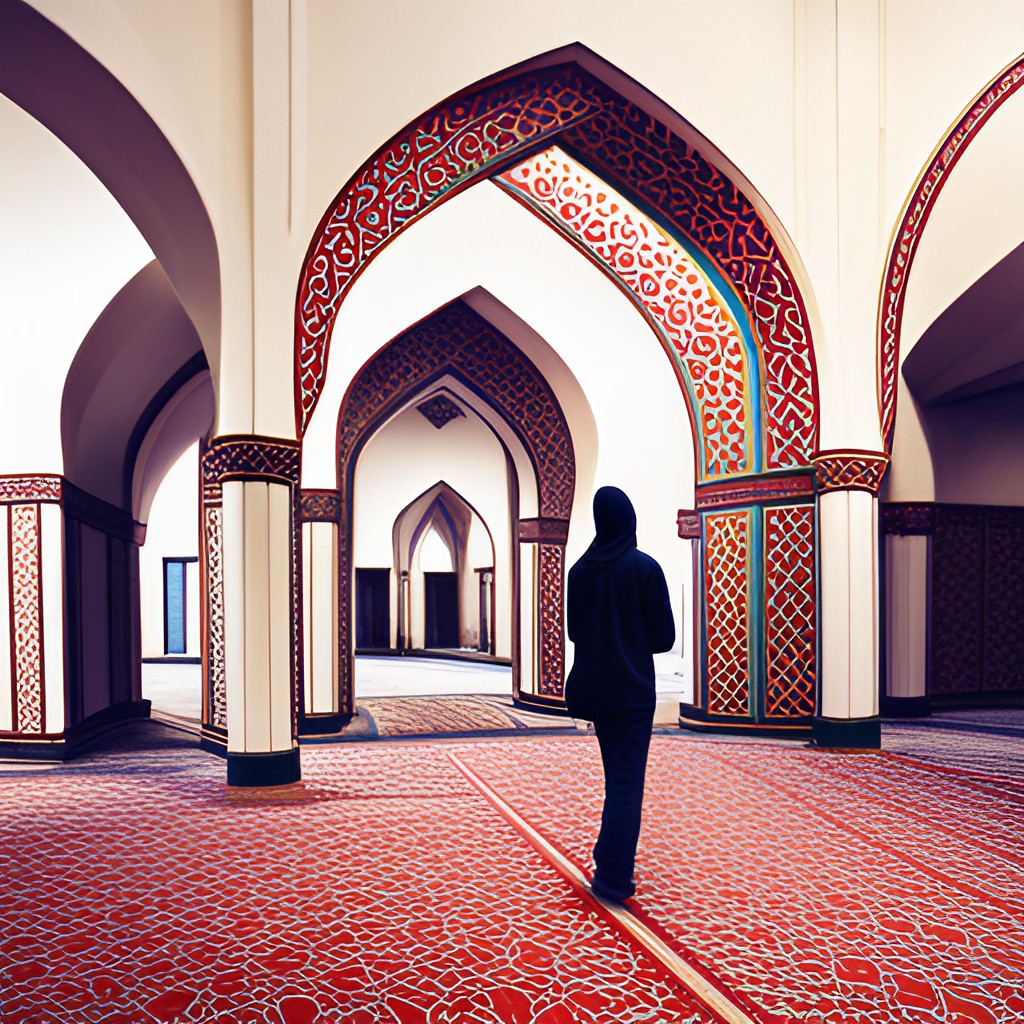Introduction
In the context of a mosque, it’s vital to understand the etiquettes and rules of What is not allowed in a mosque?. Mosques are sacred places of worship, and they maintain a set of guidelines to ensure respect and sanctity. When entering a mosque, visitors and worshipers are expected to adhere to these rules.
This article outlines the essential behaviors and actions that are not allowed within a mosque, focusing on maintaining the purity, reverence, and tranquility that define these sacred spaces.
Table of Contents
1. Shoes Inside the Prayer Hall

It is customary to remove your shoes before entering the prayer hall of a mosque. This practice symbolizes humility and cleanliness. Upon entering the mosque, you’ll often find a designated area for removing and storing your shoes.
This act of removing one’s shoes is deeply rooted in tradition and carries a spiritual significance. By leaving your shoes at the entrance, you are leaving behind the impurities of the outside world and entering a place of purity and reverence.
Shoe bags. © Cyphunk
2. Inappropriate Dress
Modesty is highly valued in a mosque. Avoid wearing revealing or provocative clothing. When it comes to dress code in a mosque, it’s important to understand that it’s not just about adhering to a set of rules but showing respect for the sacredness of the place. For both men and women, dressing modestly is a sign of reverence and humility.
Men are typically required to cover their heads with a cap or a scarf, and women are often asked to wear a headscarf (hijab) to cover their hair. While the specifics of dress code may vary from mosque to mosque, the general guideline is to dress conservatively, covering the shoulders, knees, and in some cases, even the ankles. This practice reflects the idea of humility and equality before God.
3. Eating and Drinking
Consumption of food and beverages is generally discouraged within the mosque premises to maintain cleanliness and reverence. While it’s common to see people sharing meals and snacks in various places, including religious institutions, it’s not typically encouraged within a mosque. This restriction is in place to ensure that the mosque remains clean and free from any distractions during prayers. However, there are exceptions to this rule. During special events, religious gatherings, or iftars (the evening meal to break the fast during Ramadan), mosques may provide food and drinks for those in attendance. It’s essential to be mindful of the specific guidelines of the mosque you’re visiting.
4. Loud Conversations
It is essential to maintain a quiet and peaceful atmosphere in a mosque. Engaging in loud conversations, especially during prayer times, is considered disrespectful. The mosque is a place of reflection, prayer, and spiritual connection. Maintaining a serene and tranquil environment is vital for those seeking solace and communion with the divine. This means speaking softly and refraining from troublesome behavior. It’s a place where one can escape the noise and clamor of the outside world to find inner peace and connection with the divine.
5. Disruptive Behavior
Any disruptive or disrespectful behavior, such as using mobile phones, laughing, or engaging in non-religious activities, should be avoided. Silence and respect for others are of utmost importance in a mosque. Using a mobile phone, especially with a loud ringtone or during a prayer session, can be extremely disruptive and disrespectful. It’s a common courtesy to switch off or silence your phone while in the mosque. Laughing or engaging in non-religious activities should also be avoided, as they can disrupt the contemplative atmosphere and disturb those who are engaged in prayer or meditation.
6. Entering Non-Designated Areas
Mosques often have specific areas designated for prayer and worship. It is important not to enter restricted areas or rooms without permission. Mosques typically have different sections, including the prayer hall, the ablution area, and sometimes additional rooms for religious education or administrative purposes. Some areas may be designated for men, while others are reserved for women.
It’s crucial to respect these designations and not enter areas that are not intended for your gender. Furthermore, some rooms or sections may be restricted for specific purposes or during specific times. Always ask for guidance if you’re unsure about where you should or shouldn’t go.
7. Non-Muslims in Certain Areas
In some mosques, non-Muslims may not be allowed in certain areas, particularly the prayer hall. It is advisable to check with mosque authorities for specific guidelines. The rules regarding non-Muslims in mosques can vary from one place to another. While some mosques are open to non-Muslims and may allow them to visit and observe, others may have restrictions, particularly in the prayer hall. The prayer hall is considered the most sacred space within the mosque, and access may be limited to Muslims only. It’s essential to respect these rules and seek permission or guidance when visiting a mosque as a non-Muslim.
8. Photography

Taking photos, especially in sensitive areas like the prayer hall, may not be allowed. Always seek permission before using a camera within the mosque. Photography is a contentious issue in many mosques. While some mosques may allow photography in certain areas, others strictly prohibit it, especially in the prayer hall. The reasons behind this prohibition vary. Some mosques believe that photography can be distracting and disrupt the spiritual atmosphere, while others are concerned about the potential misuse of images. It’s crucial to inquire about the photography policy of the mosque you’re visiting. If you’re given permission to take photos, be respectful and unobtrusive, ensuring that your actions do not disturb other worshipers.
9. Non-Muslim Rituals
Engaging in non-Muslim religious rituals or practices within the mosque is typically not allowed. Mosques are places of Islamic worship and should be treated as such. Engaging in non-Muslim rituals or practices within a mosque can be considered disrespectful to the faith and traditions of the mosque’s followers. It’s essential to be mindful of the purpose of the mosque and to respect the beliefs of those who gather there.
10. Disrespect to Holy Scriptures
Treating the Quran or any other holy scriptures with disrespect or carelessness is strictly prohibited. The Quran is the holy book of Islam, and it holds the utmost significance in the lives of Muslims. It is treated with respect as well as care. When handling the Quran or any other holy scriptures within a mosque, it’s essential to do so with reverence. This means not placing it on the floor or in a disrespectful manner. If you are not familiar with the proper way to handle these sacred texts, it’s advisable to ask for guidance from a mosque leader or a knowledgeable member of the congregation.
11. Mobile Phone Usage

Using mobile phones within a mosque requires particular consideration and respect. Mosques are places of tranquility and devotion, and loud ringtones or conversations can be disruptive to those engaged in prayer or reflection. When entering a mosque, it is customary to silence your mobile phone or switch it off entirely. Some mosques may even have designated areas outside the prayer hall where you can use your phone if needed. It’s essential to be discreet and mindful of the surroundings to maintain the sanctity of the mosque.
Additionally, texting, browsing the internet, or engaging in non-religious activities on your mobile phone should be avoided while inside a mosque. The focus in a mosque is on spiritual connection and worship, and such activities can distract you from the intended purpose of the visit and disrupt the peaceful atmosphere for others.
Respecting these guidelines regarding mobile phone usage is crucial to ensure that a mosque remains a place of devotion and reverence for all worshipers and visitors.
This additional section on mobile phone usage in a mosque emphasizes the importance of being respectful and considerate when it comes to technology in this sacred space.
Conclusion
These guidelines are essential to ensure that a mosque remains a place of peace, reverence, and spiritual connection for all who enter its doors. It’s important to remember that while these rules provide a general framework, the specific customs and regulations can vary from one mosque to another. When visiting a mosque, it’s always a good practice to approach the mosque authorities or members of the congregation for guidance and to show respect for the traditions and customs of the particular place of worship. By doing so, you can enjoy a meaningful and respectful visit to a mosque while honoring the beliefs and practices of its followers.
FAQ related to What is not allowed in a mosque?
Can you wear shoes in a mosque?
In most mosques, wearing shoes is not allowed. It is considered disrespectful to enter a mosque with your shoes on. This rule is based on Islamic tradition and etiquette.
1. Wearing shoes in a mosque is considered disrespectful.
2. It is based on Islamic tradition and etiquette.
3. Mosques typically provide designated areas for shoe storage.
Are non-Muslims allowed in mosques?
Yes, non-Muslims are generally allowed to enter mosques, but there are certain rules and etiquettes they should follow. It’s essential to be respectful and considerate when visiting a mosque as a non-Muslim.
1. Non-Muslims are usually allowed in mosques.
2. Respect and etiquette are crucial when visiting.
3. Dress modestly and follow the mosque’s guidelines.
Can women enter all parts of a mosque?
In many mosques, women have access to designated areas for prayer, but they may not be allowed in the main prayer hall. The specific rules for women’s access can vary between mosques.
1. Women usually have access to designated prayer areas.
2. Access to the main prayer hall may be restricted.
3. Rules can vary between different mosques.
Is it allowed to bring food or drinks into a mosque?
Bringing food or drinks into a mosque is generally discouraged and considered disrespectful unless in specific time like Ramalan or Ifthar time. Mosques are places of worship and should be treated with the utmost respect.
Can you take photos in a mosque?
Taking photos in a mosque is usually not allowed. Mosques are sacred places of worship, and photography can disrupt the peaceful atmosphere and the focus of the worshippers.
Can you wear shoes in a mosque?
In most mosques, wearing shoes is not allowed. It is considered disrespectful to enter a mosque with your shoes on. This rule is based on Islamic tradition and etiquette. When entering a mosque, it is customary to remove your shoes, and typically, mosques provide designated areas for shoe storage.
Wearing shoes in a mosque is considered disrespectful as it:
1. Disrespects the sacredness of the mosque.
2. Violates Islamic traditions and etiquettes.
3. May bring dirt and impurities into the prayer area.
Also read wearing shorts in mosque
